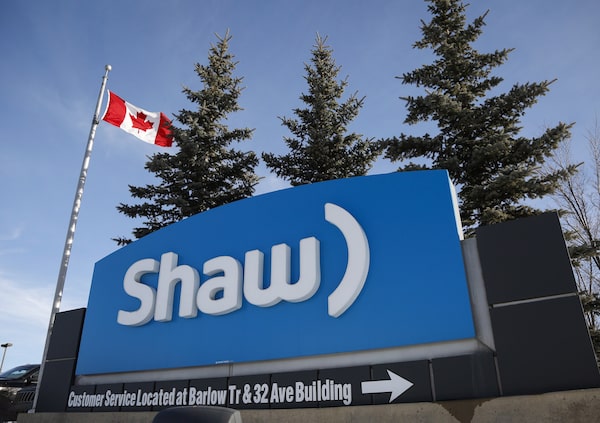
The Canadian Radio-television and Telecommunications Commission is one of three regulators tasked with reviewing Rogers’s proposed acquisition of Shaw, which is valued at $26-billion including debt.Jeff McIntosh/The Canadian Press
BCE Inc. is opposing Rogers Communications Inc.’s takeover of Shaw Communications Inc., arguing in a filing with the telecom regulator that the deal will create a broadcasting distribution behemoth with an “unprecedented level of market power.”
The Canadian Radio-television and Telecommunications Commission is one of three regulators tasked with reviewing Rogers’s proposed acquisition of Shaw, which is valued at $26-billion including debt.
While the CRTC is responsible for reviewing the transfer of broadcasting assets, the transfer of spectrum – licences to the airwaves used to transmit wireless services – must be approved by the Ministry of Innovation, Science and Economic Development. The Competition Bureau, meanwhile, is examining whether the merger is likely to result in a substantial lessening of competition.
In a submission filed with the CRTC on Monday and obtained by The Globe and Mail, BCE’s Bell Canada argues that if Rogers is permitted to acquire Shaw’s broadcasting distribution business – which includes a satellite TV service called Shaw Direct and cable networks in British Columbia, Alberta, Saskatchewan, Manitoba and Northern Ontario – it would control 47 per cent of the English-language broadcasting distribution market. (Broadcasting distribution refers to the delivery of television channels through cable, satellite or internet protocol networks.)
“Rogers will be able to control the availability of programming services in every English-language market on all available platforms as even the most popular channels will need carriage on Rogers to survive,” Bell’s submissions reads.
“This type of dominance is exactly what the commission highlighted when it denied BCE’s initial application to acquire Astral Media in 2012,” the submission continues. Bell’s first attempt to buy Montreal-based media conglomerate Astral Media Inc. was rejected in 2012 over competition concerns; the telecom later agreed to sell Astral’s stakes in 11 specialty channels and 10 English-language radio stations to appease the CRTC.
“Ironically, Rogers intervened in that process to voice its concern that, if approved, more than one-third of [broadcasting distribution undertakings] wholesale fee payments would be to Bell Media services, significantly enhancing BCE’s market power,” the submission reads.
The Globe previously reported that Bell had also made an offer to buy Shaw but, according to sources, was unwilling to take on as much regulatory risk as Rogers. (The Globe did not identify the sources because they are not authorized to speak publicly about the matter.)
Rogers said it will continue to work with the regulators as they review the deal. “Together, Rogers and Shaw will create a truly national competitor that will ensure greater choice for large and small businesses, governments and consumers and will have the necessary scale to make generational investments in broadband, 5G networks and technology which Canada urgently needs,” Matt Morgan, a spokesperson for Rogers, said in a statement.
“On top of that, this combination enables us to help bridge the divide by investing $1-billion to connect Indigenous and rural communities that lack effective high-speed internet access, while continuing to amplify and support Canadian voices and Canadian creative talent that reflect the diversity of our country,” Mr. Morgan added.
The regulatory proceeding is transpiring amid what Bell refers to as an “existential crisis” for the traditional broadcasting model, which faces intense competition from online streaming services such as Netflix and Amazon Prime.
Kaan Yigit, president of Toronto-based consumer research consultancy Solutions Research Group, said that Rogers’s acquisition of Shaw’s broadcasting distribution business would likely be “consumer-neutral” in the near term.
“I don’t think the average Shaw subscriber will see a change in their lineup, prices or diversity of offerings in the short term,” Mr. Yigit said in an e-mail. However, in four or five years, additional shifts in the video distribution and wireless markets “may create the conditions for additional Canadian players to merge,” he added.
Bell said it would like to appear at the CRTC’s public hearing on the matter, slated for Nov. 22.
Your time is valuable. Have the Top Business Headlines newsletter conveniently delivered to your inbox in the morning or evening. Sign up today.